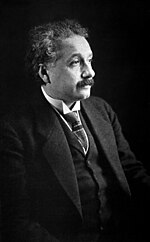శాస్త్రవేత్త
ఈ వ్యాసం లేదా వ్యాసభాగాన్ని విస్తరించవలసి ఉంది. సముచితమైన సమాచారంతో వ్యాసాన్ని విస్తరించండి. విస్తరణ పూర్తయిన తర్వాత, ఈ నోటీసును తీసివేయండి. |
ఒక క్రమ విధానంలో విజ్ఞానాన్ని అర్జించే కృషి చేసే వ్యక్తిని శాస్త్రవేత్త లేదా శాస్త్రజ్ఞుడు (Scientist) అని విస్తారమైన అర్ధంలో అనవచ్చును. లేదా వివిధ తాత్వికతలలో ఏదో ఒక విధానంతో గట్టి అనుబంధం ఉన్న వ్యక్తి కూడా శాస్త్రవేత్త అవుతాడు. కాని, సాధారణ పరిమిత వినియోగంలో శాస్త్రీయ విధానం అనుసరించి ఒక విషయాన్ని అధ్యయనం చేసే వ్యక్తి శాస్త్రవేత్త.[1] అలాంటి వ్యక్తి ఏదో ఒక శాస్త్రంలో నిష్ణాతుడు అయి ఉండే అవకాశం ఉంది.[2]

ఇది వరకు పాశ్చాత్య దేశాలలో "natural philosophers", "men of science" అనే పదాలను సుమారు ఒకే అర్ధంలో వాడేవారు.[3][4][5][6]; వీరు విజ్ఞానం (knowledge)తో అనుబంధం కలిగిన వ్యక్తులు. 1833లో William Whewell అనే వ్యక్తి "సైంటిస్ట్" (scientist) అనే పదాన్ని "ప్రకృతికి చెందిన జ్ఞానంలో నిష్ణాతులు" అనే అర్ధంలో వాడాడు. 20వ శతాబ్దంలో ఈ పదం సర్వసాధారణమైంది.[7][8] 20వ శతాబ్దానికే శాస్త్రీయ విధానము, దృక్పధము, సంస్థలు విస్తరించడం వలన "శాస్త్రజ్ఞులు" సమాజంలో ప్రత్యేకమైన గుర్తింపును పొందారు.
మానవ జీవితాన్ని ఆదిమ కాలంనుండి విజ్ఞానం (Science), సాంకేతికత (technology) ఎంతో ప్రభావితం చేశాయి. నాగరికతలో ఈ రెండు విషయాల అభివృద్ధిలోను శాస్త్రవేత్తలు ముఖ్యమైన పాత్ర కలిగిఉన్నారు. ప్రస్తుతం శాస్త్రవేత్తలలో రెండు ప్రధాన విభాగాలు గుర్తింపబడుతున్నాయి. (1) సైద్ధాంతిక శాస్త్రజ్ఞులు - వీరు లభించిన సమాచారాన్ని బట్టి కారణాలను తెలియజెబుతారు. వాటి ఆధారంగా తెలియని విషయాలను ఊహిస్తారు. (2) ప్రయోగ శాస్త్రజ్ఞులు - వీరు నమూనాల ద్వారా గాని, ఇతర విధానాల ద్వారా గాని, పరిశీలనల ద్వారా గాని కొలతలు లెక్కించి వాస్తవంగా ఏమి జరుగుతున్నదో నిర్ధారిస్తారు. అయితే ఈ రెండు రకాల శాస్త్రవేత్తలు రెండు వేరు వేరు సమూహాలు కావు. చాలా మంది అవీ ఇవీ కూడా చేస్తుంటారు. గణితం కూడా విజ్ఞానంతోనే పరిగణించడం జరుగుతుంది. గణితజ్ఞులు కూడా ఇతర శాస్త్రజ్ఞులలలాగానే సిద్ధాంతాలు చేస్తారు. ప్రయోగాలు జరుపుతారు.
శాస్త్రజ్ఞులు అనేక కారణాల వలన తమ రంగాలను ఎంచుకోవడం, ఆ రంగానికి చెందిన పనిలో నిమజ్ఞులు కావడం జరుగుతుంటుంది. చాలా మందికి "విజ్ఞానం" సముపార్జించడమే (తెలుసుకోవడమే) ధ్యేయం. ప్రకృతిలో జరిగే విషయాలు, వాటికి కారణాలు, వాటి ఫలితాలు ఇవి శాస్త్రజ్ఞులకు చాలా ఆసక్తి కలిగించే విషయాలు. ఇవే కాకుండా సమాజంలో లభించే గౌరవం, సాటి శాస్త్రజ్ఞులలో లభించే గుర్తింపు, తము కనుగొన్న విషయాలను సమాజ శ్రేయస్సు కోసం వినియోగించడంలో ఉండే ఆనందం కూడా వారికి ప్రోత్సాహకాలుగా పని చేస్తాయి. ధనార్జన కోసం శాస్త్రీయ పరిశోధనా రంగాన్ని ఎన్నుకోవడం పెద్దగా జరుగదు.
ఇవి కూడా చూడండి
మార్చుమూలాలు
మార్చు- ↑ Isaac Newton (1687, 1713, 1726). "[4] Rules for the study of natural philosophy", Philosophiae Naturalis Principia Mathematica, Third edition. The General Scholium containing the 4 rules follows Book 3, The System of the World. Reprinted on pages 794-796 of I. Bernard Cohen and Anne Whitman's 1999 translation, University of California Press ISBN 0-520-08817-4, 974 pages.
- ↑ Oxford English Dictionary, 2nd ed. 1989
- ↑ Nineteenth-Century Attitudes: Men of Science. http://www.rpi.edu/~rosss2/book.html
- ↑ Friedrich Ueberweg, History of Philosophy: From Thales to the Present Time. C. Scribner's sons v.1, 1887
- ↑ Steve Fuller, Kuhn VS. Popper: The Struggle For The Soul Of Science. Columbia University Press 2004. Page 43. ISBN 0-231-13428-2
- ↑ Science by American Association for the Advancement of Science, 1917. v.45 1917 Jan-Jun. Page 274.
- ↑ "William Whewell (1794-1866) gentleman of science". Retrieved 2007-05-19.
- ↑ Tamara Preaud, Derek E. Ostergard, The Sèvres Porcelain Manufactory. Yale University Press 1997. 416 pages. ISBN 0-300-07338-0 Page 36.
బయటి లింకులు
మార్చు- Alison Gopnik, "Finding Our Inner Scientist" Archived 2016-04-12 at the Wayback Machine, Daedalus, Winter 2004.
- Thomas Kuhn, The Structure of Scientific Revolutions, 1962.
- Arthur Jack Meadows. The Victorian Scientist: The Growth of a Profession, 2004. ISBN 0-7123-0894-6.
- For best results, add a little inspiration Archived 2008-06-21 at the Wayback Machine - The Telegraph about What Inspired You?, a survey of key thinkers in science, technology and medicine
- Peer Review Journal Science on amateur scientists
- The philosophy of the inductive sciences, founded upon their history (1847)- Complete Text
- Who was the greatest scientist ever? - Sapmura.com
- World Social Forum Sciences et dDémocratie